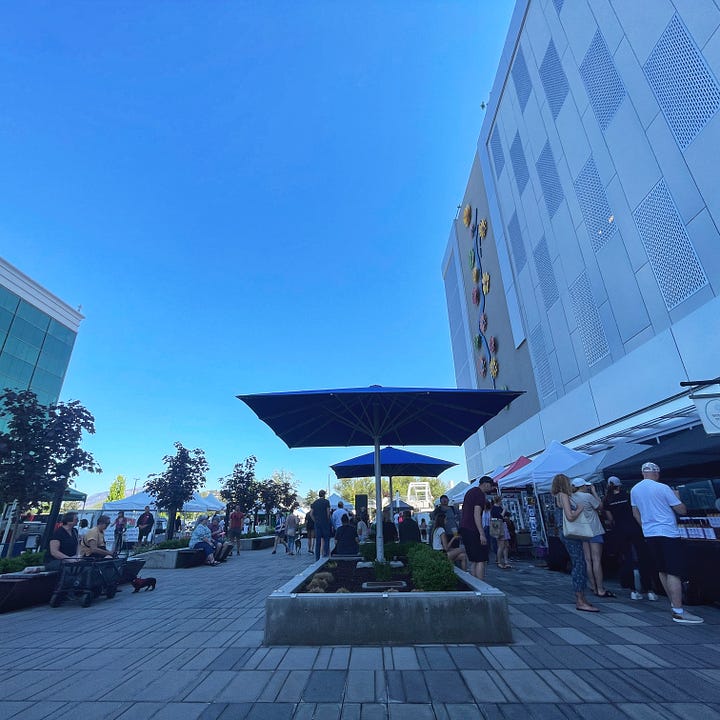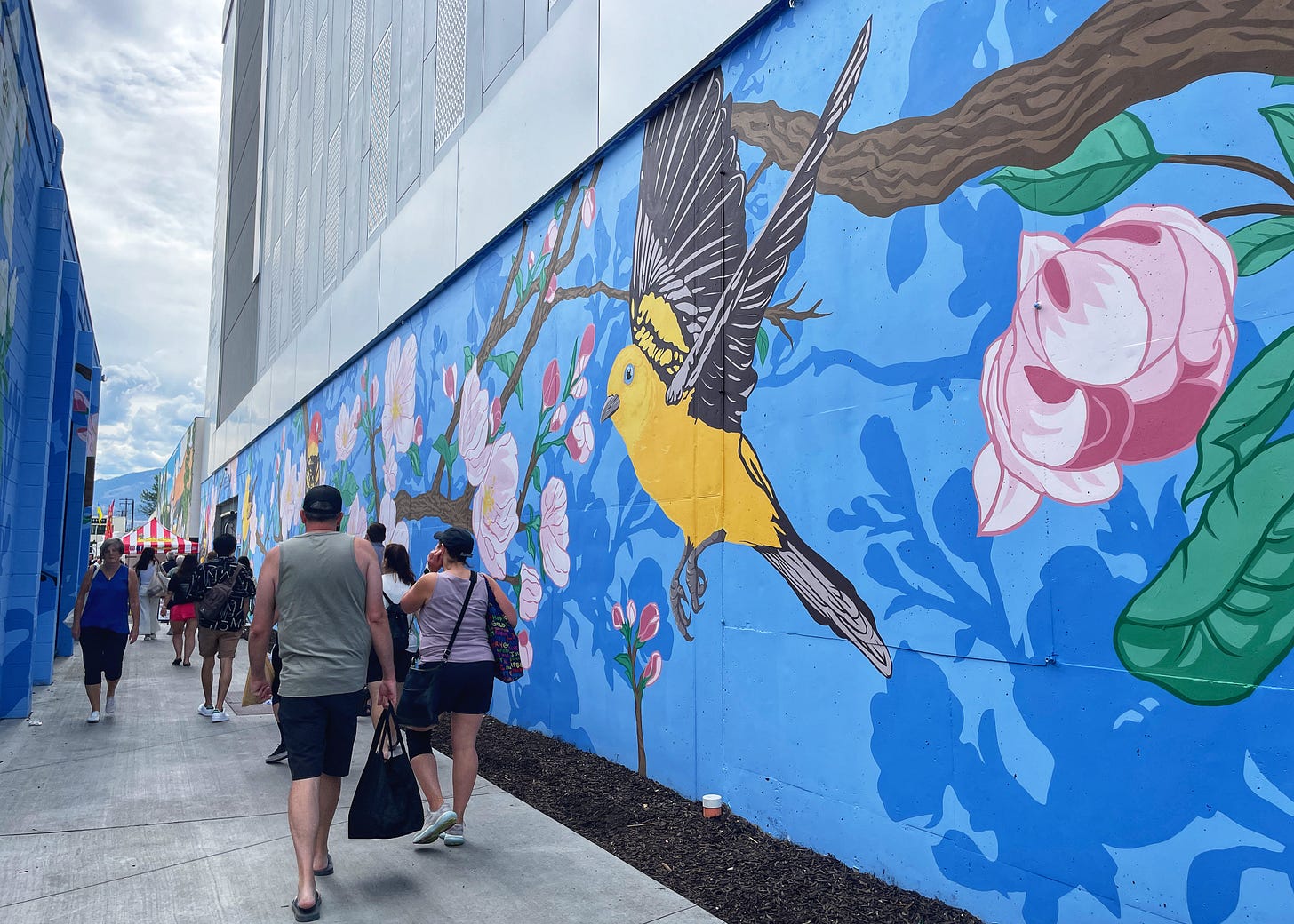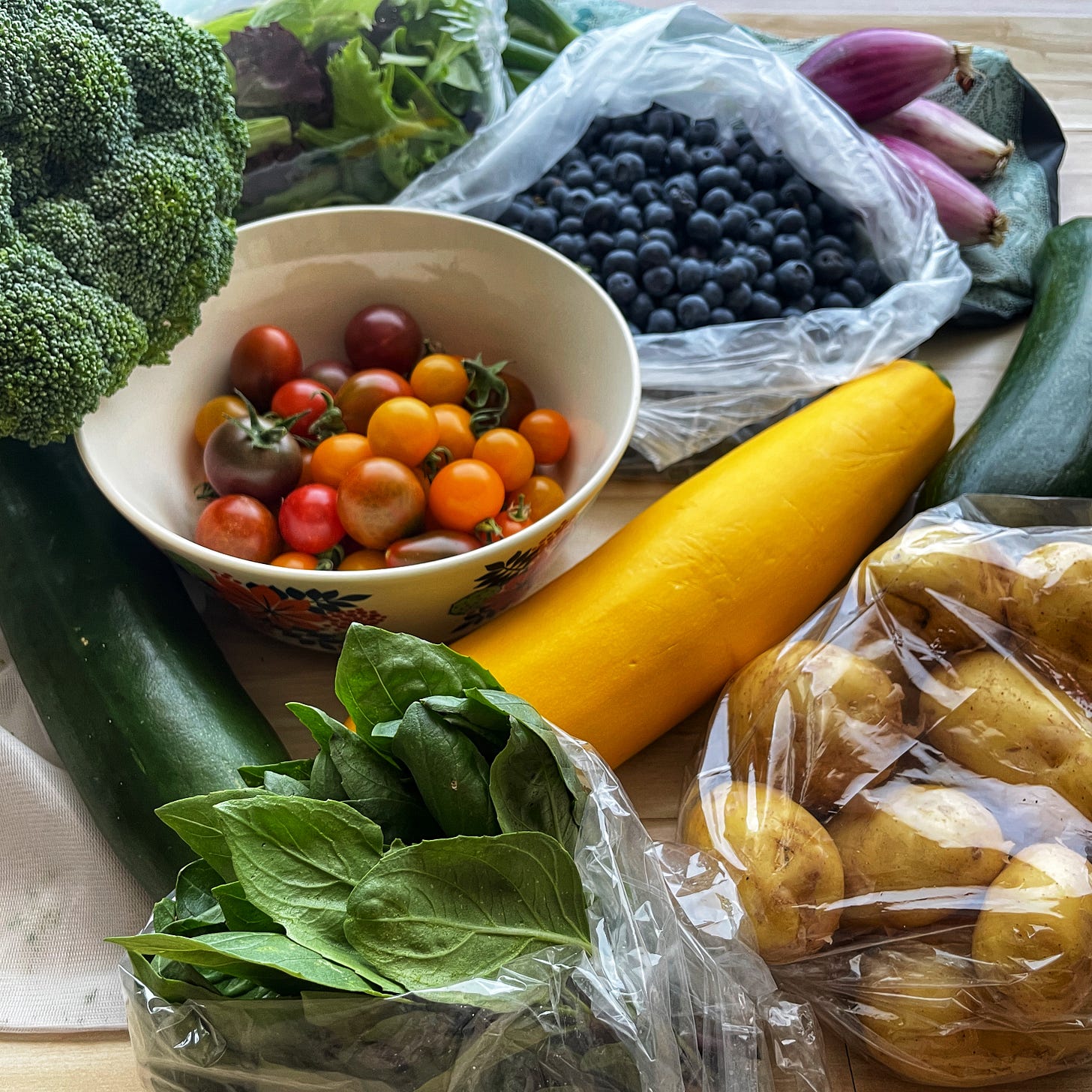Why we gather among high-rises to buy tomatoes
Farmer's markets are one way we can work through The Great Unraveling.
This year (2024), my local farmer’s market moved locations. Since I moved to Kelowna eight years ago (and for much longer before that), it’s been held twice weekly—during the spring, summer, and fall—in an empty parking lot on the corner of two busy roadways, across from a shopping mall. The spot was (sort of?) convenient but also hectic and uncomfortable. There was never anywhere to really sit down and hang out: I recall having numerous “picnics” with friends on the grassy median right next to two lanes of traffic whizzing by. One time, we watched a car accident happen right in front of us (nobody was hurt but it was jarring). During the heat dome of 2021, it was cancelled because, as it turns out, standing on asphalt for multiple hours when it’s 40C is not good for people or produce.
So, it was high time!
Sidebar: farmer’s markets *are* for everyone
Can I just rant about something for a minute? The conventional/industrial grocery vs farmer’s market argument. I’m over it. While I get it (and I’m over here still occasionally buying bananas because I’m human), the idea that industrially-grown food is cheaper is literally a false reality we humans have created, by artificially deflating the cost of food and removing externalities from the supply chain (labour costs, environmental costs, etc.). Farmer’s markets have the perception of being more expensive because they don’t remove those costs. As it turns out, this idea is not always true. I will let Rebecca at Little Schack explain.
The reason why this argument grinds my gears is that I end up feeling like I’m being gaslit for believing that farmer’s markets are a meaningful and realistic solution to (some of) the problems our world faces today. Sure, we may not all be able to shop for 100% of our groceries from a farmer’s market, but every bag of salad or bundle of onions you opt to get from a market vs a conventional grocery store is a chip in the industrial food complex. It matters.
I’m one of those stubborn optimists who feels in her bones that, if we can, shopping at a farmer’s market is one of the biggest ways we, as our small human selves, can feel empowered in a collapsing world.
The Great Turning
Recently, I tuned in to a short podcast series called ‘We Are the Great Turning,’ by Jess Serrante in conversation with the renowned environmental activist, Joanna Macy. Together, they introduce the concept of ‘The Great Turning’ by teaching three stories. These stories describe the world, from different viewpoints: Business As Usual, The Great Unraveling and The Great Turning.
They go on to explain that, right now, we’re experiencing The Great Unraveling, as a result of the Business As Usual mentality that has gotten us here (capitalism, colonialism, extraction, industrialization, militarization, slavery). The work—so that we don’t go insane or give in to doomer or defeatist energy—is to, through insight and compassion, forge a new path, a Great Turning. The challenge is that we have to do this work while living through the Great Unraveling.
It is hard work. It is heart work. It is rage- and tear-filled and also requires us to play, talk, listen, be compassionate, ask questions, and find our community.
Farmer’s markets are, to me, one way we move towards The Great Turning. They make the work feel less difficult.
Why we gather among high-rises
When the market moved to a more urban region of our city, I was kind of nonplussed, but I think it was a pretty big deal for the community. People were nervous: it was the first time the market had moved since forever! It would require new parking mechanisms and a new vendor layout. It was in a new part of town. Would people find it? Would they come? Would they be disgruntled about it? Would it be weird that it sits in the middle of concrete-and-glass high-rises?
To me, the most unique thing about the new market location is…the new location! The market is very literally surrounded by capitalism. On two days of the week, at the base of several mid- and high-rise glass towers sit three zones of market vendors. The buildings (which house major Canadian corporations and other business enterprises) cradle several dozen small and independent businesses selling everything—and I mean everything—from clothing to candles, honey, and fresh produce.
The new location also fosters social connection much better than the old parking lot ever could. There are places to sit, rest, and gather. Shade on the hot days. Beautiful murals painted on the sides of buildings, and accessible pathways to a park across the highway.


After observing this change and visiting the new location several times this season, I’m realizing…I love this so much. It feels subversive, the opposite of capitalism. In the middle of corporate Kelowna are a bunch of independent business owners, selling things they made or grew by hand.
This is the way things should be.
The way things should be
One summer day at the market, I visited one of my favourite vendors, 4 Elements Farm to pick up some absurdly fragrant Thai basil. I was overjoyed to find that they weren’t yet sold out, so I bought a bag and had a nice chat with Michael about his vacation to the coast. (Side note: it makes me so happy when I hear farmers talk about taking vacations. Yes to rest!)
I moved on to other vendors and ended up at Forbes Family Farm to purchase the prettiest tomatoes and melon. While I was there, Michael ran over to me, concerned that I had grabbed the wrong bag of basil and wanted to correct the mistake. We confirmed I had the right bag, but I was pretty surprised that he took the time to find me and make sure.
I love that. That’s the way things should be.
Conventional grocery stores tell us to pull out a shopping cart at a building devoid of windows and fill it with produce from who knows where, picked by a faceless person or grown by a machine, on a farm owned by someone who isn’t the person picking.
Regional farmer’s markets might feel like a fun luxury, but they are literally anything but. These are the life-sustaining things we need to put more effort into if we are to imagine what The Great Turning looks like. Supporting the farmers right in front of us is a good place to start.
The antidote for everything
It’s now November, and last month the market celebrated its last Saturday outside at its new location (it’ll continue over the winter in an indoor spot). The day turned out to be a bit sloppy from light rain, and there was a distinct chill in the air. But, the variety of options on that gloomy Saturday was enough to make me feel like the sun was shining anyway.
Michael had his epic salad mix as usual, along with zesty garlic, crisp cabbage, and the most tender beets and carrots (cutting into them is like cutting through butter). Little Schack had fresh arugula that Lenny harvested by headlamp the night before, plus fragrant dill, and—shockingly—tomatoes! The Wise Earth folks had bags of onions, spicy and immediate tear-jerkers when cut into (in the best way). My favourite potatoes were in abundance at Zelaney (if you are confused about why I have a favourite potato, please read this). I found the zaniest-coloured candy roaster squash from Forbes Family Farm, and purple (yes, purple!) cauliflower from There and Back Again Farm. (TABA also had the crunchiest, leafy celery.) All this abundance, in late October, on the cusp of winter.
Obviously, on a gloomy, rainy day, there was only one thing for it: I had to make soup. Really, it’s Rebecca at Little Schack’s fault: she suggested on Instagram that all the ingredients for seasonal borscht would be available at the market. It was so satisfying to gather the ingredients and then, over a few hours, quietly chop veggies and layer them together into something truly heart-warming.
And that’s it: it’s heart-warming, soul-food. I’m thinking a lot these days about the work of The Great Turning. It feels more relevant than ever. It’s heart work and it’s hard work, but one thing that has helped me make sense of things, and where I find my antidote to everything wrong with the world, is my farmers market. When I ground myself in that reality, I feel a sense of agency and possibility.
(Making soup also helps. 🍲)
Ukranian Borscht by Olena Osipov (recipe shared by Rebecca and Lenny at Little Schack)









Nice blog post friend!!
This was amazing and made me hungry and sad I haven't been to that market yet. Out of sight, out of mind for me. Which is awful! But the old location was an easy reminder when I went by that way on Wednesday's en route to other things. Can you please remind me and maybe take me with you next time! Or next season, I guess :)
But oh my yes to everything you said here! And I'm so glad there are farms I can shop at all over the place to and from town, so even if I miss the market, I still have these many venues, because there's nothing like fresh produce and meeting the farmers! As always, well expressed and inspirational, my friend! :)